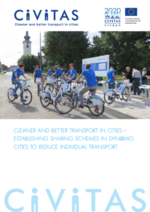Car sharing
Summary
Congestion, increased levels of air pollution, lack of parking spaces - there are many reasons why levels of private car ownership should be decreased. But what then? Car sharing introduces a new means of staying mobile, countering the financial challenges of owning a car. Following the success of its bike scheme introduced in 2008, Brescia has increased the modal choices offered to citizens through its Car Sharing service.
Implementing sustainable mobility
The Car Sharing service can be considered an intelligent way of driving everywhere without the financial 'disadvantages' which characterise private car ownership. Its implementation represented an important innovative step for Brescia regarding the modal split of the city and aiming at an integrated view of transport systems. Linked with both the establishment of a new metro line and the 'smart city' image of Brescia, the Car Sharing service has been integrated within the existing Italian network of car sharing, known as Initiative Car Sharing (ICS).
Considering the medium size of the city and the geographic distribution of its citizens, a feasibility study was prepared within CIVITAS to investigate the needs of potential users of the service. In parallel, a benchmarking exercise evaluated other similar experiences in Italy to find out the best way to manage car sharing. A scheme suitable for Brescia was defined and the tender documents for the award of service were prepared.
The main challenge addressed after the tender was related to Car Sharing fleet dimension in relation to the city size. Muovosviluppo (the company who won the tender) decided to focus its offer more on the variety of options and agreements instead of on the fleet size, which would be increased step by step, according to the success of the initiative. The definition of the potential users has been fundamental to the success of the service.
Progress
The car sharing service was launched in Brescia in March 2010 and its fleet was initially composed of 6 cars, half of which were powered by natural gas. Seven reserved parking places were located in the city. Before the end of the CIVITAS project, the car sharing scheme counted more than 290 subscribers.
Users are able to book the car sharing vehicle through the internet. The service administration system then organises the cars, considering the time and place chosen by users. Users pick up the car after 24 hours from the chosen point using their contactless cards, and vehicles have to be brought back again to the same parking place at the end of the journey.
Outcomes
The results of the measure showed that, due to the small fleet, environmental indicators were not considered significant in relation to the emissions reduction at city level. The quality of service and the vehicle occupancy have been assessed through a survey of Car Sharing subscribers. Perceptions of the scheme were positive, with an awareness level of 29% and an acceptance level of 16%, while a mean value of vehicle occupancy equal to 1.7 highlighted the use of car sharing mostly for individual trips.
A Cost-Benefit Analysis was performed to assess the measure from an economic point of view. The investment cost borne by the Brescia Municipality (EUR 194,000) to support the car sharing CIVITAS measure can be recovered in 15 years through savings on fuel and emissions, only if the total number of kilometres run by the car sharing service fleet reaches 1,526,420 km. This means that, the car sharing service, with its low usage (i.e. 16,022 km made in 2010 and 44,142 km in 2011), must register a yearly increase of 28.8% during the next 15 years in order to reach its target.
In the future, the service will be upgraded by enlarging the fleet, implementing new fares and extending the dedicated parking areas, to be integrated according to the new public transport network of the city.









